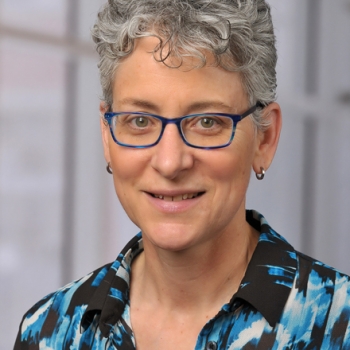Marielle C. Brinkman
Research Professor
Epidemiology

“I knew from a very young age that I wanted to work in a laboratory. I was also raised in a family that placed a heavy emphasis on moral behavior and choosing a vocation that contributes to making the world a better place. The College of Public Health connects me with the top-notch people and resources needed to inform regulatory decision-making and achieve the overarching goal of enhancing public health. In my role, I’ve come to see the scientific method as one of the strongest tools we have to guide us as we navigate our societal well-being. The college also strongly supports mentorship of the next generation of diverse scientists, which allows me to joyfully repay the debt I owe to all of my mentors.”
Biography
Marielle has over 28 years of experience conducting human exposure assessment research, including a special focus on the use of non-invasive exhaled breath analysis to inform tobacco regulatory control for the last 17 years. She has designed, fabricated and validated a research-grade waterpipe for use in human topography measurement and estimated active and passive toxicant exposures resulting from waterpipe tobacco smoking.
Marielle has lectured internationally and nationally on a variety of tobacco regulatory topics, including how testing protocols and waterpipe design and components influence toxicant emissions. She contributes to international tobacco regulation as an active participant in the World Health Organization Tobacco Regulatory Laboratory (WHO TobLabNet) and has co-authored four WHO reports providing recommendations on waterpipe and other tobacco product emissions testing.
Marielle has and is currently leading several federally funded projects specific to waterpipe use, including an R01 grant evaluating optimal placement and content of health warning labels; an R01 grant quantifying the effect of WP tobacco ingredients on human puffing, exposures and appeal; an FDA contract to measure the harmful and potentially harmful constituent (HPHC) content of waterpipe tobacco-use waste products; and a Center grant (P50) that includes standardizing methods to measure waterpipe smoke emissions.
She is affiliated with the University of Maryland Tobacco Center of Regulatory Science.
Education
- B.S.
- Chemistry, University of Illinois, 1987
Select publications
- Brinkman MC, Mehta T, Pennell ML, Angeles D, Kahassai S, Wu CM, Curran H, Keller-Hamilton B, Klein EG, Roberts ME, Nini P. Effect of graphic warning label on acute changes in waterpipe tobacco smoking behavior, biomarkers of exposure and harm, and subjective effects in a randomized trial. Addict Behav. 2026 Jan 1;172:108520. doi: 10.1016/j.addbeh.2025.108520.
- Peraza N, Thakur RS, Jabba SV, Aguilera J, Martines PW, Brinkman MC, Jordt SE, El Hellani A, Monterosso JR, Tackett AP. Pre-and Post-Flavor Ban Oral Nicotine Pouches: A Chemical, Sensory, and Young Adult Appeal Analysis. medRxiv. 2025 Dec 12:2025-12. doi: 10.64898/2025.12.10.25341992.
- Keller‐Hamilton B, Curran H, Atkinson L, Suraapaneni S, Hinton A, Chrzan K, Mays D, El‐Hellani A, Wilson CW, Brinkman MC, Wagener TL. Examining the role of freebase nicotine in the harm reduction potential of oral nicotine pouches versus moist snuff: A randomized crossover trial. Addiction. 2025 Jul 1:10.1111/add.70114. doi: 10.1111/add.70114.
- Patterson JG, El-Hellani A, Brinkman MC, Keller-Hamilton B. Oral Nicotine Pouch Misuse Popularized Online Raises Concerns. Nicotine Tob Res. 2025 Jun 28:ntaf136. doi: 10.1093/ntr/ntaf136.
- Spinola VB, Singer JM, Klein EG, Wagener TL, Brinkman MC, Tackett AP, Lu B, Wagner DD, Wold LE, Roberts ME. Longitudinal Analysis of E-Cigarette and Cannabis Dual Use in an Ohio Sample of Adolescents and Young Adults. Addict Behav. 2025 Aug 4;170:108444. doi: 10.1016/j.addbeh.2025.108444.
- Alalwan MA, Mays D, Berman ML, El-Hellani A, Keller-Hamilton BL, Brinkman MC, Wagener TL, Tackett AP. Oral nicotine pouch manufacturer’s reduced exposure claims require evidence and regulatory oversight. Tob Control. 2025 May 15;34(3):410-411. doi: 10.1136/tc-2024-058610.
- Stepanov I, Berman M, Brinkman MC, Carll A, Exil V, Hansen EG, El Hellani A, Jabba SV, Kassem NOF, Rezk-Hanna M, Talhout R, Stroup AM. Sugars in Tobacco Products: Toxicity Research and Implications for Tobacco Product Regulation. Chem Res Toxicol. 2025 May 19;38(5):747-58. doi: 10.1021/acs.chemrestox.4c00550.
- Keller-Hamilton B, Sloan R, Mehta T, Hinton A, Tackett AP, Roberts ME, Brinkman MC, Wagener TL. An observational human laboratory assessment of nicotine delivery, vaping topography and subjective effects of usual brand electronic cigarette use among young adults. Addiction. 2025 Mar;120(3):503-13. doi: 10.1111/add.16531.
- Keller-Hamilton B, Curran H, Alalwan M, Hinton A, Brinkman MC, El-Hellani A, Wagener TL, Chrzan K, Atkinson L, Suraapaneni S, Mays D. Evaluating the Role of Nicotine Stereoisomer on Nicotine Pouch Abuse Liability: A Randomized Crossover Trial. Nicotine Tob Res. 2025 Mar 24;27(4):658-665. doi: 10.1093/ntr/ntae079.
- Kassem NOF, Strongin RM, Stroup AM, Brinkman MC, El-Hellani A, Erythropel HC, Etemadi A, Exil V, Goniewicz ML, Kassem NO, Klupinski TP, Liles S, Muthumalage T, Noël A, Peyton DH, Wang Q, Rahman I, Valerio LG Jr. A review of the toxicity of ingredients in e-cigarettes, including those ingredients having the FDA's "Generally Recognized as Safe (GRAS)" regulatory status for use in food. Nicotine Tob Res. 2024 Oct 22;26(11):1445-1454. doi: 10.1093/ntr/ntae123.